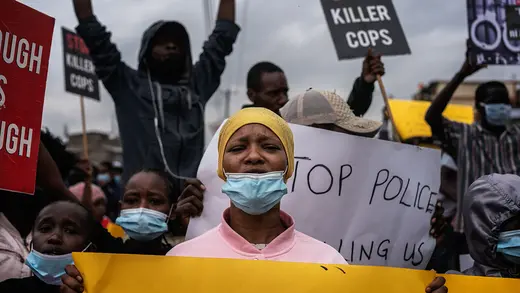Why African Nations Support U.S. Anti-Racism Protesters
The U.S. protests following the police killing of George Floyd have spurred solidarity among many Africans, who have expressed widespread outrage against police brutality.
By experts and staff
- Published
By
- Jendayi E. FrazerAdjunct Senior Fellow for Africa Studies
How are African nations reacting to the anti-racism protests in the United States?
The main reaction has been one of solidarity. African leaders in government, civil society, and creative communities have condemned the police killing of George Floyd and raised alarm about police brutality and systemic racism in the United States.
One of the earliest and most broadly representative statements was made by African Union Commission Chairperson Moussa Faki Mahamat, who recalled that the Organization of African Unity issued a resolution in 1964 condemning racial discrimination in the United States. He reiterated the African Union’s rejection of the continuing discrimination against Black citizens. In addition, the UN Human Rights Council agreed to hold a debate on racism and police brutality after fifty-four African nations proposed such a discussion. The solidarity of African and African-American people dates back to the early days of fighting for independence from colonialism in Africa and for civil rights in the United States.

Africans are questioning whether the United States can maintain its moral position as a defender of human rights globally, given the recurring extrajudicial killings of Black Americans with police impunity. Some have expressed shock and sadness. Others have pointed out U.S. hypocrisy in not respecting human rights and protesters’ constitutional rights of freedom of assembly and speech, values it often preaches to African governments.
Civil society and academic leaders have also called out their own governments for sanctioning excessive use of force and failing to hold police accountable for killing civilians. They lament that African dictators will feel emboldened by U.S. President Donald J. Trump’s actions against demonstrators. They point out that people of African descent worldwide are often treated as if they do not deserve human dignity.
Because of their skin color, Africans in the United States have also been killed by police, including Guinean student Amadou Diallo, who New York police shot forty-one times in 1999, Sudanese refugee John Deng, who Iowa City police killed in 2009, Ugandan immigrant Alfred Olongo, who San Diego police shot in 2016, and so many others.
Police violence is not unknown to many African communities. Are any countries making efforts to reform police forces that could be replicated in the United States?
Police reform has not been a major focus of African governments nor the wider international community that provides them with some security training and resources. African policing practices grew out of the colonial system in which the police pacified and dominated Africans rather than protecting their human rights.
Recent protests have drawn attention to police brutality in Africa, especially as it relates to maintaining coronavirus lockdown and curfew orders. As a result, some countries, such as Kenya, Namibia, South Africa, and Uganda, have taken steps to curb police brutality and hold officers accountable for excessive use of force in the implementation of lockdown orders. These have included making statements that police should respect citizens’ rights; investigating cases of abuse, especially when filmed; and charging officers with assault, though no trials have been held yet. However, these actions do not reflect lessons learned in either direction—Africa is not providing models for the United States and the changes discussed in U.S. cities and in Congress are not yet providing an example for other countries beyond the general focus on ending police brutality.
You served as U.S. ambassador to South Africa. What lessons could the United States learn from South Africa’s struggle with racism?
No matter who holds power and whatever the race of the police officer or chief, there is a need to dismantle the structural inequality left from legacies of discrimination and to abolish the white supremacy that is at the root of it all. The main lesson is: a luta continua, i.e., the struggle continues!
South Africans’ struggle against racism and African Americans’ struggle for civil rights have often been mischaracterized as peaceful. Both movements were marked by extreme government-sanctioned violence largely carried out by police. Police and security forces were deployed to maintain the political and social order of legal discrimination and Black subjugation in order to perpetuate white supremacist ideologies.
With the advent of majority rule in South Africa, the African National Congress ruling party attempted to transform the police force, renaming it the South African Police Service and instituting reforms intended to build trust in the police. However, the legacy of apartheid remains today as economic power, access to services, and educational opportunities largely remain with the white population. The criminalization of poverty continues today in South Africa just as it does in Black communities in the United States. Poverty and soaring unemployment are still found in largely segregated Black communities in South Africa. Policing is far more aggressive, brutal, and unaccountable in these poorer communities. In the United States, the heightened police suspicion of all Black people can lead to overreactions that quickly become deadly.